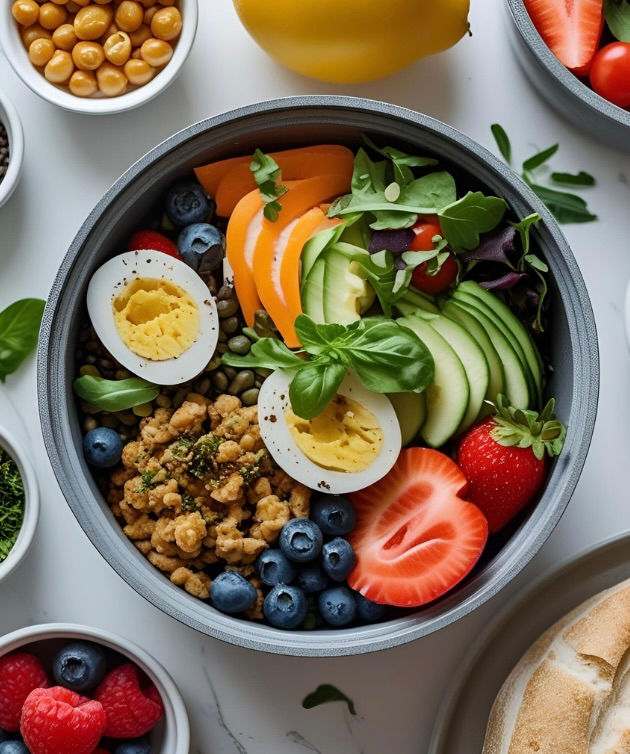How to Stay Energised All Day: Nutrition Tips for High-Performing Professionals
- craighepple
- Jun 1, 2025
- 3 min read
Long meetings, tight deadlines, intense workouts, and decision fatigue — if you’re a high-performing professional, staying focused and energised throughout the day can feel like a constant battle. But the truth is, your energy levels aren’t just about sleep or coffee — they’re directly tied to how (and when) you fuel your body.
In this post, you'll get simple, actionable nutrition strategies to keep your energy steady, productivity high, and mental focus sharp — all without relying on endless caffeine.

Why Professionals Often Struggle with Energy
If you regularly hit an energy slump mid-afternoon or feel like your brain is in a fog by 3 p.m., you're not alone. The biggest reasons behind this include:
Skipping meals or delaying food intake
Relying on quick fixes like sugary snacks or energy drinks
Not eating enough protein or fiber
Poor hydration
Erratic blood sugar levels caused by high-carb or low-quality meals
The good news? You can fix most of this by making a few key changes to your nutrition habits — no overhaul required.
1. Start with a Protein-Packed Breakfast
Skipping breakfast or grabbing a carb-heavy snack (like toast or cereal) is a recipe for a mid-morning crash. Your first meal sets the tone for your blood sugar and energy all day.
Better:
Greek yogurt + berries + nuts
Eggs on wholegrain toast
Protein smoothie with oats and banana
Why it works: Protein helps stabilize blood sugar, reduces hunger later, and supports brain function.
2. Eat Consistently — Every 3–4 Hours
Instead of giant meals or long fasts, aim for consistent fueling. This prevents big dips in energy, improves mood, and keeps you focused.
Sample meal timing:
7:30 a.m. — Breakfast
11:00 a.m. — Snack or light lunch
2:00 p.m. — Second lunch or protein shake
6:30 p.m. — Dinner
8:30 p.m. — Light evening snack if needed
3. Prioritize Protein and Fiber at Every Meal
Both help regulate energy levels, support lean muscle, and keep you full — meaning fewer cravings and distractions.
Aim for:
25–35g of protein per meal
A mix of soluble and insoluble fiber (vegetables, oats, legumes)
Example meals:
Chicken and quinoa salad
Stir-fry with tofu and brown rice
Tuna wrap with mixed salad
4. Avoid the “Blood Sugar Rollercoaster”
High-sugar snacks, white bread, or overly processed foods may give you a short burst of energy — but the crash that follows is brutal.
Swap this:
Flavoured granola bars → Protein bar or boiled eggs
Fizzy drink or fruit juice → Sparkling water with lemon
White bread sandwich → Wholegrain wrap with lean protein
5. Stay Hydrated (More Than You Think)
Even mild dehydration can lead to fatigue, poor concentration, and headaches.
Tips:
Start your day with 500ml of water before coffee
Carry a reusable water bottle
Aim for at least 2–3L/day (more if you train)
6. Use Caffeine Strategically
Caffeine can boost focus, but overdoing it backfires. If you're constantly sipping coffee, your energy regulation (and sleep quality) can suffer.
Smart caffeine tips:
Wait 60–90 minutes after waking before your first coffee
Cut off caffeine by 2–3 p.m.
Use green tea or matcha for a gentler energy boost
7. Plan Ahead (Even a Little Helps)
Busy days mean you’ll grab what’s convenient — so make convenience work in your favour.
Keep stocked:
Pre-cooked chicken or tuna pouches
Boiled eggs
Protein shakes or bars
Washed fruit + raw veg sticks
Overnight oats or chia pudding
Sample Day of Eating for All-Day Energy
Time | Meal | Why It Works |
7:30 a.m. | Protein oats + berries | Balanced carbs, fiber, protein |
10:30 a.m. | Greek yogurt + handful of almonds | Fights hunger, supports focus |
1:00 p.m. | Chicken stir-fry + brown rice | Hearty, steady energy |
3:30 p.m. | Protein shake + apple | Fights the afternoon crash |
6:30 p.m. | Salmon + sweet potato + greens | Omega-3s, fiber, and long-lasting fuel |
8:30 p.m. | Cottage cheese + berries | Light but satisfying pre-bed snack |
Takeaway: Eat to Support the Demands of Your Day
Food isn’t just fuel — it’s your performance enhancer. When you eat well and consistently, you don’t just avoid energy crashes — you think more clearly, recover faster, and get more done with less stress.
Want Help Building Your High-Energy Nutrition Plan?
If you’re tired of relying on caffeine or guessing what to eat, I can help. My coaching programs are designed for high-performing people who want to eat better without spending hours cooking or tracking.
👉 Book a Free Transformation Call






Comments